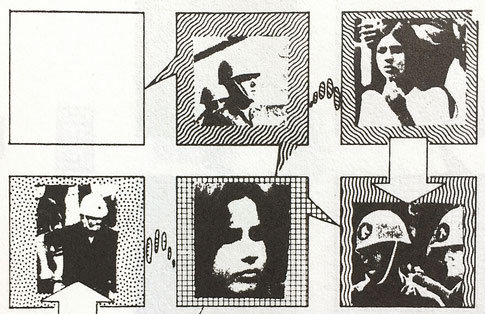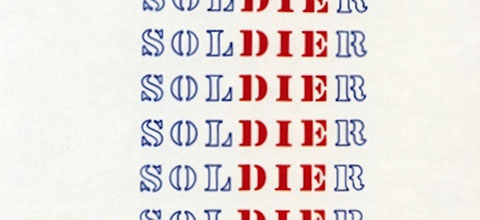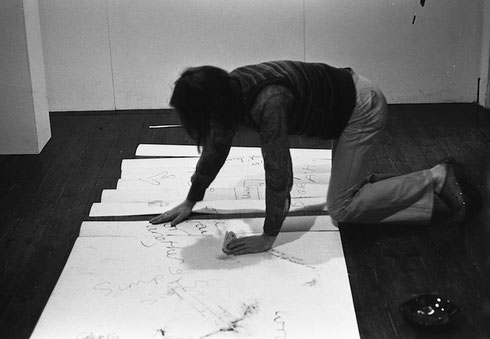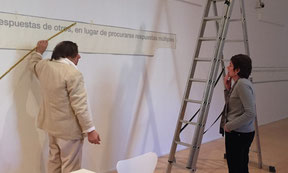PROJECTS UNTIL 2018
HANDOVER OF THE SOUND COLLECTION GUY SCHRAENEN
6 April 2018
Centre for Artists' Publications / Museum Weserburg Bremen
Friday, 6 April 2018, the purchase and official handover of the renowned "Sound Collection Guy Schraenen" to the Centre for Artists’ Publications is celebrated in the Museum Weserburg in Bremen.
The collection is internationally the largest and most important collection of Sound Art with a unique range of acoustic works from the beginning on until the 1980s. It consists of about 1000 artist records, audio CDs and audio cassettes, numerous visual works in form of graphics, drawings, scores, posters, object records, sound objects and unique items, as well as an extensive documentation and library.
From now on, a sound art work from the "Sound Collection Guy Schraenen" will be broadcasted every day on: soundcollection.de. Additional information: Sound Collection Guy Schraenen

COMICS REVISITED
8 March - 8 June 2018
Museo Nacional Centro de Arte Reina Sofia, Madrid
Curatorship: Guy Schraenen
When Stéphane Mallarmé wrote that ‘everything in the world exists in order to end up as a book’, today it seems that everything, from the Bible to the most iconic literary masterpiece, ends up in a comic. Comics Revisited reveals unexpected encounters between comic and other artistic languages, a productive dialogue in which narrations and abstractions, strips and panels, plane colours and speech balloons, heroes and legends come to new senses and possibilities.
More: Comics Revisited

OTHER BOOKS AND MORE
Lecture by Guy Schraenen
5 November 2017
FLAT, fiera libro arte Torino (Torino art book fair)

Starting from his personal experience as gallerist, filmmaker, archivist, curator, and author in the multi-faceted world of artists’ books, Schraenen talks about his friendship and collaboration with Ulises Carrión (San Andrés Tuxtla, Mexico, 1941 – Amsterdam, 1989). Carrión, author of the renowned The New Art of Making Books (1975) was an Amsterdam based artist, publisher, curator, and theorist of the post-Sixties generation. For FLAT, Schraenen will address the multi-faceted complexity of Ulises Carrión’s work, which includes not only literature, videos, theoretical essays, curatorial projects and actions in public spaces, but also the co-founding of the independent artist-run space In-Out Center, as well as the founding of the legendary bookshop-gallery Other Books and So: the first space of its kind to be entirely dedicated to artists’ publications. Guy Schraenen will also explore Carrión’s approach to poetry as opposed to a more classic academic approach, closing the talk with the presentation of Carrión’s video-documentary Bookworks Revisited. Part 1: A Selection, 1987.
Additional information: FLAT Art Book Fair

THE ARTISTS' BOOK KEYWORD DIRECTORY
Presentation by Guy Schraenen, initiator of the project and Maike Aden, scientific development and elaboration
23/24 November 2017, IV Jornadas de Bibliotecas de Museos - BIMUS (annual conference of museum libraries), Museo Reina Sofia Madrid

The ARTISTS' BOOKS KEYWORD DIRECTORY will provide cataloguing standards that are especially applied for the enormous diversity and complexity of artists’ publications. The intention is pragmatic: It provides a concrete and effective system for catalogers to inventory artists’ publications in all their specific aspects as precise, unambiguous and uncomplicated as possible. In consequence, researchers and curators have a tool for future access to these interesting art works, that are often 'hidden' between their book covers in boxes on shelves of storages.
Additional information: IV Jornadas sobre Bibliotecas de Museos

VIOLENCE IN WAR AND PEACE
21 September 2017 - 2 March 2018
Museo Nacional Centro de Arte Reina Sofía, Madrid
Curatorship: Guy Schraenen
Violence in War and Peace presents the publications from roughly thirty artists that range from the book Kriegsfibel(1955) by Bertolt Brecht and its “sequel” War Primer 2 (2011) by Oliver Chanarin and Adam Broomberg, to the recent work “Oh God”, He Said, Talking to a Tree (2010) by Walid Raad. Whether the terrifying violence is represented in a brutally direct fashion or through intimate, almost poetic images, all of these works denounce the dreadful threat of terror, the effects of which are, independent of possible causes, of comparable horror for any human being.
Violence in War and Peace deals with images of victims—soldiers and civilians alike—wrenched by the barbarity and chaos of catastrophic war and different scenes of violence, such as riots, terrorist acts, or nonviolent demonstrations that are violently repressed.
This exhibition deals mainly with artistically appropriated documents or interpretations. In contrast to deadline-driven journalists, art allows a more reflexive way of approaching violent acts. Its strategies for visualizing, revealing, and denouncing violence are countless, ranging from the use of historical photos to concrete poetry. Many of the artists explore the intentions behind the horror and the manipulation of images and words that often play on the attractiveness or even aestheticization of violence —whereby the belligerent parties, be they leftists or rightists, revolutionaries or counterrevolutionaries, democrats or fascists, often employ similar verbal and visual strategies in their propaganda.
All together, the chosen publications can be seen as tangible expressions of the eternal use of violence, illustrated by the Optimistic Box No. 1 (Thank God for Modern Weapons) (1968) by Robert Filliou. Once in a while it occurs that a courageous attitude can interrupt those dynamics. Letter to a Refusing Pilot (2013) by Akram Zaatari gives, as the artist states, “a human face” to an individual act of disobedience.
Additional information: Violence in War and Piece

IT'S OVER AND OVER
Lecture by Guy Schraenen on occasion of the Wiels Art Book Fair 2017, Brussels
09.09.2017, 16:00
WIELS Auditorium

Guy Schraenen, curator of the exhibition Ulises Carrión. Dear reader. Don’t read at Museo Nacional Centro de Arte Reina Sofía and Museo Jumex wil speak from his own experience and his experience of collaborating with Ulises Carrión. Schraenen will address the complexity of such a versatile body of work that comprises literature, video, film, theoretical production, the opening of a bookstore and gallery space, curatorial and public projects, among others. He will also delve into Carrion’s concept of poetry against the classic academic approach.
Additional information: Guy Schraenen, Wiels

A TRANSATLANTIC AFFAIR
Essay by Guy Schraenen; in: Mirtha Dermisache. Porque ¡yo escribo!, Museo de Arte Latinoamericano de Buenos Aires, Buenos Aires, 2017, Spanish and English
This retrospective revolves around the work of Argentine artist Mirtha Dermisache (Buenos Aires, 1940-2012), from her first book produced in 1967 to her final pieces produced in the 2000s. Dermisache’s body of calligraphic works entailed what Roland Barthes called “illegible writing”; starting in 1971, that French critic took great interest in Dermisache’s art, pointing out her ability to get at “the essence of writing.”
"A transatlantic affair" is an essay by Guy Schraenen, friend and publisher of Mirtha Dermisache since 1974.
Additional information: Mirtha Dermisache. Because I write

PHOTOstructuralism. The Composition of the Page as a Concept
15 June 2017-10 September 2017
Museu Serralves, Porto
Curatorship: Guy Schraenen
The exhibition PHOTOstructuralism reveals a broad diversity of conceptual investigations to the use of photos as formal elements in artists' publications. It explores a very specific aspect for the first time: the photo as constitutive element of an overarching structure. Contrary to the traditional photo montage or photo collage, where an assembling of photo elements compose a singular image, the purpose is to place emphasis on the structured space of grouped photos which at the same time have a significant value in their own right. Regardless of whether the photos are taken by the artists or found, whether they are arranged on one autonomous sheet, one or several pages or the entire body of a book, and regardless too, whether it consist of a serial, sequential or randomly scattered ensemble, of a saturation or only of one photo. The core question is not only how the structure exposes and organises the photos but also how it sets them in motion. A motion to which the beholder can respond in his own way when he lets the eyes wander between the photos and their interspaces, up and down, left and right, back and forth. By associating formal or thematic affinities within the configurations such as repetitions, reiterations, differences, oppositions, conflicts, juxtapositions, contacts and separations, the narration starts to migrate and a space for thinking, reading, seeing, interpreting and discovering comes to life. In particular the spaces in between the images open up a "common space for thought", as Aby Warburg (1866–1929) called it.
Additional information: PHOTOstructuralism. The composition of the page as a concept
THE BLOODY ALPHABET, OR HOW TO CRACK IT
Text by Guy Schraenen; in: Gerrit Jan de Rook; Andrew Wilson: Michael Gibbs. All or nothing, Uniformbooks, Devon; Boekie Woekie, Amsterdam, 2017
Michael Gibbs wasn’t only the “unsung hero of concrete poetry”, as B.E. Mitchel calls him, but also evidence that an artist who could be considered as a destructor of language is in fact—as so many artists of his time—an essential component which makes the machine function. The quotation in his essay All or nothing of the often dispraised French poet Jean Cocteau: “All texts are only alphabets in disorder” points towards the purpose of his subversive attitude. By creating unexpected images and meanings, Michael Gibbs questions the alphabet as a tool of the power system. His cracks appear to create disorder, but in fact he puts everything in a new place, and forces us to look beyond the limits of our conventional language.
Still today, the work and engagement of Michael Gibbs offers discoveries. It proposes a way beyond the ossified and conformist art world which attempts to dictate our behaviour and functionality. If he and his fellow campaigners are considered marginal, their actions are the seed in the darkness of the soil which emerge to bear fruit.
Additional information: Michael Gibbs. All or nothing

ARTISTS' BOOK. A COMPREHENSIVE TRILOGY
2014-2017
Museo Nacional Centro de Arte Reina Sofía, Madrid
Curatorship: Guy Schraenen
PART I:
IT IS NOT NEW, IT IS A BOOK
September 23, 2014 - April 2015

It is not new, it is a book, a quotation by Jacques Louis Nyst, is the title of the first in a series of exhibitions to be presented in the Library and Documentation Centre of the Reina Sofía Museum. The aim of this series is to present every aspect of the artists’ book. Both individual and thematic exhibitions are programmed.
Artists’ books emerged in the early sixties when artists of all tendencies were exploring the book as a creative space. They no longer considered the book as a container for information but as an artwork with its own significance. The artist’s book created a new genre of art in a period where conceptual art and intermedia art forms were very influential. Most books have an essentially conceptual character; if not in terms of their style then in terms of the perception of the space of the book and the consideration of how the book can be made into one coherent artwork.
The books selected for this exhibition are pertinent examples that illustrate the book in the most lapidary way. Conceptual analysis runs like a threat through the ensemble. Developing from page to page, they become pure reflections on the concept of the book itself. They convey no images, texts or stories, or only in such a way as reduces the subject to itself. They are books in the strictest sense of the term because the object represents only itself. Most of these books can therefore be considered as tautological works.
The works in this first exhibition represent attempts to perceive and to analyse an object that has existed for centuries. Although the book itself was not new, the idea of an artwork in the shape of a book was new. These works of art can only exist as books. In times of digitalisation they celebrate and give new life to the book.
PART II:
I CALL THEM SIMPLY BOOKS
18 May - 23 September, 2015
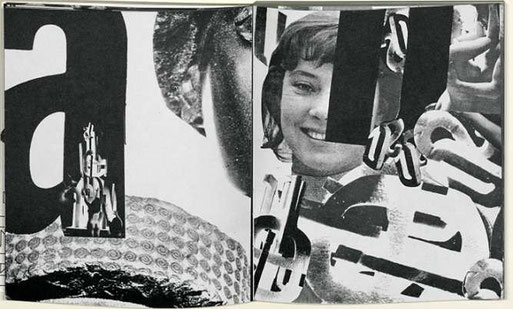
The exhibition I call them simply books, devoted to the «book as book», is part two of the previous one, called It is not new, it is a book, that it was a purely conceptual approach to the book. The title is a quotation by Peter Downsbrough, an American artist who has published numerous «books» since 1972.
Artists’ books are a new and revolutionary way of dealing with the space of the book, it is not considered any more as a mere container of information, but as a creative space. These books are generally of average format, of traditional appearance and the materials and printing techniques are unexceptional; but while the conventional books and their content can be diffused by other media, the artists' books of this exhibition can only exist as books. They are, even published in several hundreds of copies, original art works. The various drawings, photographs, etc., used to be reproduced in these works should not be considered as originals, but the books themselves, the book as a work of art. Thus we call them "books" in the same way we call a painting "painting".
The key work of this exhibition, curated by Guy Schraenen, is Stéphane Mallarmé's Un coup de dés jamais n'abolira le hasard (1897). Mallarmé liberated the text from the traditional page layout for the first time in history. Sixty years later, artists were taking over the space of the book in a wide variety of ways to avenge themselves from the dictate of the word and its power-system. Through the multiplicity of focuses, theses artists’ books oblige the reader-viewer to call into question his own approach to the book. The concept takes priority over the matter. As the content unfolds, the reader-viewer can follow the logic of the art work step by step.
Appearing in the ideological context of the 1960s, these artists' books were the democratic artistic product par excellence. Thanks to the simple form and modest price of these publications, artists aimed to give the widest audience possible the opportunity to encounter and become familiar with contemporary art.
The artists' books conquer their place in museums as «books», and in libraries as «works of art».
Additional information: I call them simply books
______________
PART III:
I AM ALSO NOT A BOOK
21 September 2016 – 22 May 2017

I Am Also Not A Book is the title of the last part of a trilogy of exhibitions which includes It is not new, it is a book (from September, 2014 to May, 2015) and I call them simply books (from May to October, 2015). On this occasion, the title refers to the 1973 work by John M. Belis, I Am Also not a Book, which consists of a card with the sentence “Attach this card to any book-type object and it will become a genuine John M. Belis,” and which can indeed be affixed to any book-shaped object.
In the past, artists and writers had already created book works that escaped from the traditional form, material, and concept of a book. For these chosen books, the appearance, content, or aim of the conventional book is used as a model for a transformation into a new representation, similar to, for example, when a body is taken as the model for a painting or a sculpture. Sometimes the model is recognizable, sometimes it is subverted. The possibilities of mutating the book range from a single page by Jiří Valoch to a large concrete block by Wolf Vostell. Les Écrits (1965-1990) by Daniel Buren seems to be a banal publication of collected writings. But by packing the three volumes into a banderole that carries his “visual tools,” the vertical stripes, the work becomes an example of the extended language of this visual artist who entangles his intellectual ideas and his visual language to the point of indistinguishability.
In all the exhibited books or objects, the use of understandable language is abandoned in favor of the visual form. By destroying the ordinary aspect of the book, the artists do not destroy the idea of the book; rather they draw attention to the myths about the author and the book as a tool of the powers that be.
Additional information: I am also not a Book

THE EIGHTIES - A DECADE OF EXTREMES. REVSTD BY CLUB MORAL
17 June 2016 to 7 August 2016
M_hka - Museum of Contemporary Art, Antwerpen
On occasion of the exhibition The Eighties – A Decade of Extremes in the M_hka - Museum of Contemporary Art in Antwerpen, Club Moral presents In Vitro rvstd with contriutions by Guy Schraenen Archive.
Additional information: Club Moral

AXE FILM FESTIVAL IN MONTESPECCHIO
12 August 2016
Studio Montespeccio di Jan van der Donk, Montespecchio, Italy
Presented are films by Brion Gysin, Degottex and François Dufrêne, produced by Guy Schraenen éditeur and flms by Guy Schraenen, after works by Eduard Bal, Françoise Janicot, Bernhard Heidsieck, Ulises Carrión.

"DEAR READER. DON'T READ"
ULISES CARRIÓN RETROSPECTIVE
15 March 2016 - 3 October, 2016
Museo Nacional Centro de Arte Reina Sofía, Madrid

A key figure in Mexican conceptual art, Ulises Carrión (1941, San Andrés Tuxtla, Mexico – 1989, Amsterdam) was an artist, editor, curator, and theorist of the post-1960s international artistic avant-garde.
This retrospective focusing on Ulises Carrión’s personal and groundbreaking approach seeks to illustrate all aspects of his artistic and intellectual work. The exhibition spans from his early career as a young, successful writer in Mexico, to his college years as a postgraduate student exploring language and linguistics in France, Germany, and Britain, to his numerous activities in Amsterdam, where Carrión established himself in 1972 and lived until his untimely death at the age of forty-nine.
The exhibition is composed of nearly 350 pieces that include books, magazines, videos, films, sound pieces, mail art, public projects, and performances, along with Carrión’s initiatives as curator, editor, distributor, lecturer, archivist, art theorist, and writer. It is a significant body of original work structured so as to place a spotlight on every facet of his production.
Without losing sight of the unclassifiable nature of his oeuvre, this exhibition emphasizes Ulises Carrión’s constant search for new cultural strategies and the extent to which his projects were determined by two fundamental themes: structure and language, representing artistic guidelines that, influenced by a literary education, are pervasive in his work even if he always fought against it. This duality corresponds to the exhibition title "Dear reader. Don’t read"—taken from his diptych of the same name—which illustrates his ambiguous relation to literature, a recurring theme in his work.
Additional information: Ulises Carrión retrospective at Museo Reina Sofia
___________________
EXHIBITION CATALOGUE
DEAR READER. DON'T READ. / QUERIDO LECTOR. NO LEA.
including an audio CD with sound works by Ulises Carrión
Museo Reina Sofia, Madrid, 2016
Available in English and Spanish
The exhibition catalogue provides different perspectives on the personal and professional life of Ulises Carrión, his experimentation with literature, language and linguistics, as well as some of the reasons that led him to develop his many creative facets outside of Mexico. The publication, edited by Guy Schraenen, contains a series of photographic and archive images which illustrate themes and practices that Ulises Carrión made: art mail, cinema, collaborations, conferences, exhibitions, performances, video, ephemera, among others.
Authors: Maike Aden, Felipe Ehrenberg, João Fernandes, Javier Maderuelo, Guy Schraenen, Jan Voss and Heriberto Yépez.
The book is accompanied by a CD with the sound work The Poet's Tongue (1977)
Order: Alga Marghen /// Boekie Woekie /// Museo Reina Sofia
___________________
A DAY FOR ULISES CARRIÓN
Conference, 21 September 2016, 11 a.m.
Museo Nacional Centro de Arte Reina Sofía, Madrid, Auditorium Sabatini Building
Contributors: Luigi Amara, Mario Bellatin, Felipe Ehrenberg, Javier Maderuelo, Raúl Marroquín, Heriberto Yépez.
Introducing talk by Guy Schraenen: The Tongue of the Poets. His topics: Making an exhibition of a highly multifaceted body of work / Collaboration with Ulises Carrión / Poets versus academics.
Additional information: A day for Ulises Carrión
___________________
ULISES CARRIÓN RETROSPECTIVE "DEAR READER. DON'T READ."
IN MEXICO
9 February 09 - 30 April, 2017
Museo Jumex, Mexico-City
After being shown in Museo Reina Sofía Madrid, the Ulises Carrión retrospective "Dear reader. Don't read" opens its doors in the Fundación Jumex in Mexico, the country where Ulises Carrión (1941-1989) was born and where he started his early career as a writer.
Additional information: Ulises Carrion, Dear reader. Don't read, Museo Jumex Mexico
___________________
THE TONGUE OF THE POETS
Opening Lecture by Guy Schraenen, 13 February 2017, 1 p.m.
Museo Jumex, Mexico-City

Guy Schraenen will discuss the organization and arrangements of the exhibition. Speaking from his experience collaborating with the artist, he will address the complexity of such a versatile body of work that comprises literature, video, film, theoretical production, the opening of a bookstore and gallery space, curatorial and public projects, among others. He also will delve into the antonomies between the tongue of the poets and academic approaches.
Additional information: Opening lecture Museo Jumex
TYPE DE SUPPORT : LIVRE D'ARTISTE ETC.
12 March to 4 April, 2016
Centre des livres d'artistes (cdla), Saint-Yrieix-la-Perche, France

On occasion of the exhibition type de support : livre d'artiste etc. the REVUE AXE, published by Guy Schraenen éditeur, is presented at the cdla.
Additional information: Broshure

MORE THAN A CATALOGUE.
The Catalogue Cassettes of the Museum Abteiberg Mönchengladbach
15 October 2015 - 16 April, 2016
Museo Nacional Centro de Arte Reina Sofía, Madrid

This exhibition, curated by Guy Schraenen, is devoted to the outstanding originality of this series of grey cardboard boxes, with which Johannes Cladders provided an unconventional and pertinent overview of the international vanguard art of the period, including seminal movements such as Conceptual Art, Fluxus, Arte Povera, Pop Art, etc. Made between 1967 and 1978 in limited and numbered editions, these boxes are unique in their conception. Their design was entire responsibility of each of the invited artists, and results of their complicity with the museum. All of them have similar sizes (ca. 21 x 17 x 3 cm), but each one is different in content and form. Some of them include posters, booklets, documentation and texts, while others comprise multiples: for example, the plastic rose by Jasper Johns, a series of four boxes by Marcel Broodthaers, a ca. 15 meter long parcel string by Panamarenko, and a huge, black, crumpled silk paper with gold print by James Lee Byars, enclosed in a golden box. Further boxes include original pieces such as the felt piece cut by Joseph Beuys, and the hand-painted inside of the box by Gerhard Richter.
These few examples give an overview of the richness of this collection of 33 different pieces (the 34th box, by stanley brouwn, exists only as a concept), which nowadays are considered rarities, and occupy a prominent place in international collections, among them the Library and Documentation Center of the Museum Reina Sofía.
Additional information: More than a catalogue

DÉJÀ-VU. REPETITION AND DIFFERENCE
From 26 September 2015 to 03 January 2016
Museum Serralves, Porto
Curatorship: Guy Schraenen

This exhibition will reveal an until now untreated theme in the field of artists' publications: the fascinating conjunctions between the phenomenons of trivial products of the everyday life and art works. In the confrontation of mass-media publications with artists' publications, the exhibition will create an open stage on which formal coincidences are shown as inspiration resources and on which meanings and effects are made by the context in which the respective publications are presented and perceived. A limited section will show the revers side of the theme. It will point out how designers, advertisers, and aesthetic advisors plagiarize and transform, reedit and remix the aesthetics of historical and contemporary art works into new scenarios of their publications in the culture of visual marketing.Both parts of the exhibition will reveal the accordingly correspondences by presenting each document with its original parallel.
The spill of the exhibition will be a recently rediscovered, rare exemplar of the second volume of the Japanese architecture book Ginza Haccho (1954) by Yoshikazu Suzuki, presented alongside with an ikon of artists' books, Every Building on the Sunset Strip (1965) by Ed Ruscha, published 12 years later. Side by side the two accordion foldout formats present astonishing similarity in their concept. Coincidence or inspiration?
Additional information: Déja-Vu

MY BUENOS AIRES
June 20 - September 20, 2015
La Maison Rouge, Paris
A selection of works by Mirtha Dermisache, published by Guy Schraenen éditeur is presented in the context of the exhibition My Buenos Aires at La Maison Rouge in Paris.
Additional information: My Buenos Aires, La Maison Rouge, Paris

MEDIA_MUTACIONES
10 May - 21 June, 2015
Tabacalera Promocion del Arte, Madrid
Letter-essay Dear Concha, dear José by Guy Schraenen in the catalogue on the occasion of the exhibition Media_Mutaciones, Concha Jerez y José Iges.
Additional information: media_mutationes
THE LIBERATED PAGE
November 21 - December 28, 2014
The Liberated Page, Le Commun, 28 rue des Bains, Geneva

The biennale will highlight the work of several contemporary artists concerned with the page, in conversation with historic examples as books from artists Dieter Roth, Ed Ruscha, and Seth Siegelaub, bookworks from publishing houses Something Else Press and Ecart, an anthology by Guy Schraenen, the Mèla post card book from Maurizio Nannucci, as well as the Franklin Furnace archive.
Additional information: The liberated page

OPEN BOOK. ARTISTS' BOOKS AND PHOTOGRAPHY
13 - 16 November 2014For the exhibition Open Book. Artists' Books and Photography at Paris Photo in the Grand Palais Paris, the photo book Encoconnage photographed, designed and edited by Guy Schraenen in 1974 was selected. The book includes 92 photos by Guy Schraenen of Françoise Janicot's performance on Passe-Partout n° 9 by Bernard Heidsieck. It contains also a 30 cm record with the version 1 and 3 of Encoconnage Passe-Partout n° 9.
Additional information: Paris Photo 2014
Previous projects: Please click here

